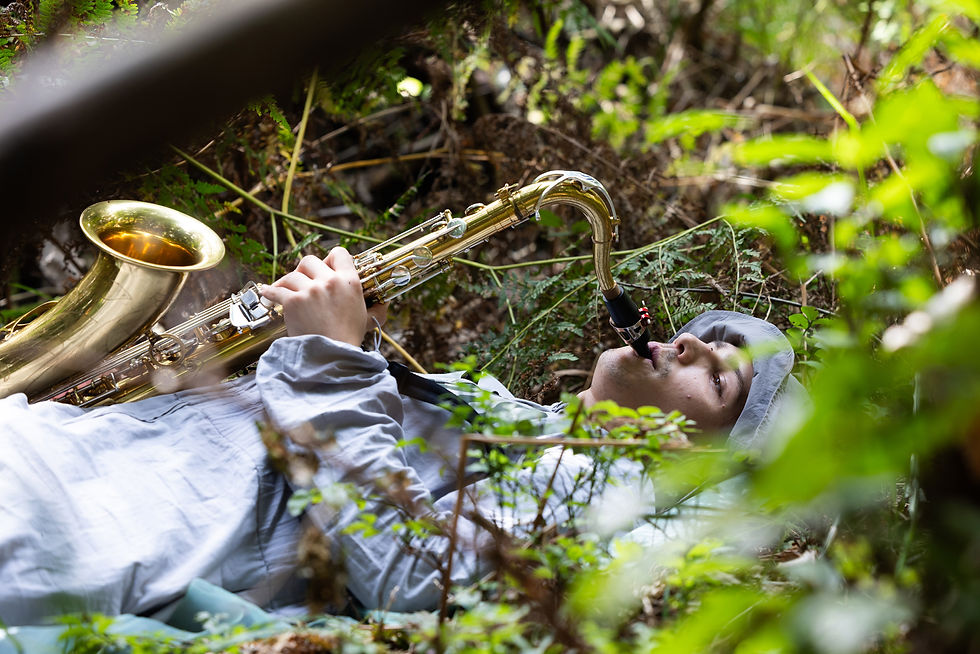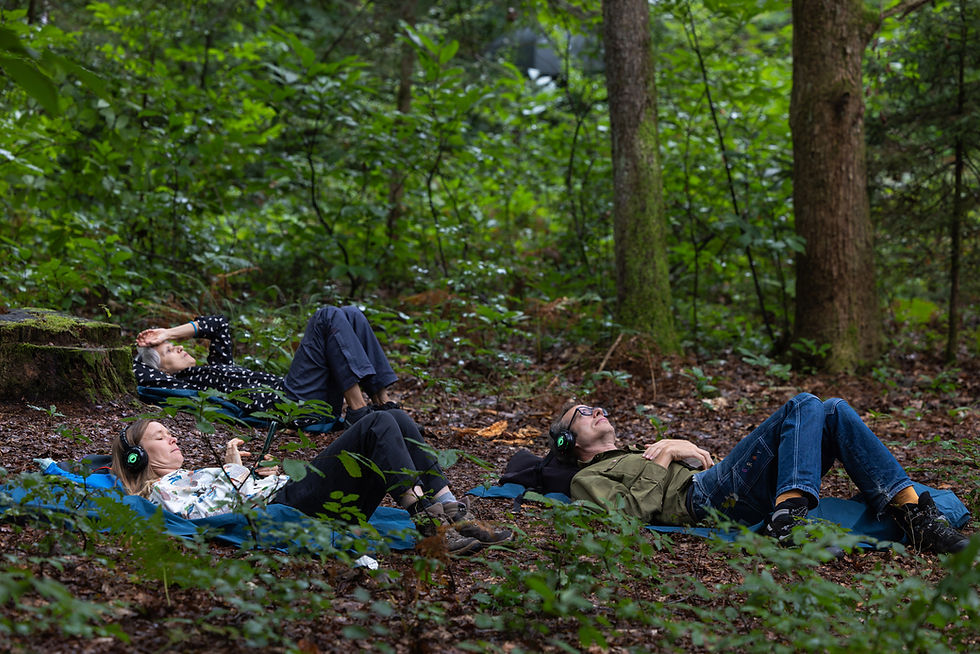A seven-hour performative walk "Shared Landscapes" took place every day from 22 to 25 August as part of the Mladi Levi festival 2024 organized by Bunker. Ljubljana is another place in the duo’s series that invites people to interact with woods and meadows and with each other, guided by the facilitators and headphones. The performance composed of 7 pieces directed by 7 different artist or duos includes live music and installative interventions, an audio play to listen to on the forest ground, an augmented reality experience and more — all in the area of Tivoli, Rožnik and Šišenski hrib park, the Koseški boršt woods. After seeing the dress rehearsal, Valeriia Buradzhyieva talked to the project’s curators Caroline Barneaud (France-Switzerland) and Stefan Kaegi (Switzerland-Germany) who also conceived one of the 7 pieces.

Photo: Nada Žgank
Valeriia: You modify every ‘“Shared Landscapes” version of your piece (the audioplay that opens up the walk) by inviting the local people to act for it. Tell us about your approach.
Stefan: For each version of my piece, we invite a real forester, a psychoanalyst, a child, a metereologist and a singer to bring their perspectives to the improvised conversation about the forest. All of them, except the singer, had to be from the area where the piece takes place. This time the meteorologist was none other than Andrej Velkavrh, who, I am told, has a certain cult status as a weather forecaster in Slovenia. Here the piece has a particularly precise Slovenian tone thanks to Tjasa Črnigoj, who led and edited the conversation in Slovenian.
Valeriia: And why is the singer always from elsewhere? Stefan: For the role of the singer, we always invite people from foreign countries where the forest has a special connotation. The Ukrainian singer Oksana Zhurauel-Ohorodnyx in the Avignon version, for example, has her own background story, because her father was a policeman who was sent to the Red Forest to liquidate the Chernobyl nuclear disaster. She also spoke about how the forest where she grew up became a landmine as a result of the Russian attack on Ukraine.
For the iteraion in Lausanne we found a singer from Japan, in Berlin there was a Brazilian singer, in Austria an Iranian who spoke about the political implications in Italy. For Ljubljana, we invited a Venezuelan. We decided to make the singer foreign because the forest is often ‘occupied’ by right-wing people who have this mentality of ‘my home, my country, my forest’— at least in Germany we have this connotation. So we thought it would be good to integrate people who bring a different connotation, from a ‘different side of the forest’.
Caroline: And also to do something on a local level, but with international echoes and connections.
Valeriia: When you started preparing for the Ljubljana version, did you look at other natural sites besides Koseški boršt?
Stefan: We had another option, Sračja dolina. Actually, the audio recording was done in there and not in Koseški boršt, because back then we still were not sure which one we will end up with. You can still go and visit it and tell us that it would have been a better one.
Valeriia: With this scale of a stage—a whole forest—I can imagine it’s easy to get carried away in the artistic intentions. My question is kind of from the contrary—was there anything that you didn’t want to do dramaturgically in “Shared Landscapes”?
Caroline: There was this hike that you (reffering to Stefan) went to, and you said that there were basically things that could have been anywhere else, but they were just brought to this place, so it was like a supermarket of performances in the landscape for a large audience. Like a theatre show but just outdoors, on a mountain — we didn’t want that.
Stefan: We certainly didn't want to set up a stage. Or bring a generator to the woods to produce electricity.
Valeriia: Yes, I remembered wondering what the huge screen installed in the woods for the Conde de Torrefiel piece runs on.
Stefan: It's on batteries. So it's not without electricity, but it sort of is.
Caroline: We also didn’t want a kind of landscape where you go because it's so beautiful…
Stefan: We made some compromises, though. (Smiles)
Caroline: …We didn’t want a landscape known for its spectacular view or its very old famous tree, something that is too special. We wanted to go to places that are not so well known and that are not in the guidebooks that you pick up when you want to enjoy “beautiful nature”.
Stefan: We also had to stay within reach of the cities, because our partners, in the end, are theaters that are located in the cities.
Caroline: Yes, we didn't want to turn some meadow into a parking lot, because the only way to get there is by car. So you could say that we were looking for the first "accessible" nature when you drive out of the city. So not too special, but nice and more diverse in terms of living creatures than in the city center. It was also important for us not to go into fragile ecosystems. That's why the place we're in is more like a park, because we wanted to go where people already go and not find the really protected and wild place. Wildness was not the idea from the beginning.
Valeriia: How much time did it take you to develop “Shared Landscapes” for Ljubljana?
Caroline: We started the conversation with Bunker around two years ago.

Photo: Nada Žgank
Valeriia: How did you cast the local actors? Apart from the ones in the audio play, I was impressed with the local farmer you involved in the piece on the meadow.
Caroline: The particularity of this project is that we work closely with the local partners. We come to them with a concept, we make a list of examples of what we've done before, of the specification of the casting and the technical needs of location scouting. So most of the work is done by the Bunker team, in collaboration with us and also with the production team of theatre Vidy Lausanne. But yes, it's mainly local partners working on the ground and finding the people.
Valeriia: In the part where the audience interacts with the landscape and with each other using the prompts in the headphones, there was a moment when the instructions kind of broke the fourth wall. It was when the voice in the headphones said that some of audience members who have done these practices many times— and these are, I understand, mainly people connected with performance professionally— might feel like rolling their eyes and abstain from participating. From my observations, it's true that audiences who have less experience are often more open and curious to participate, even if the opposite may seem more realistic.
How do you deal with the fact that your pieces are experienced by all kinds of audiences, "trained" and "newcomers"? Does this destinction bother you at all?
Stefan: We were discussing recently, how much you should prepare the audience, what to announce and what not to…
Valeriia: Yes, what the audience knows beforehand can sometimes make or break the piece…
Caroline: Participation was never a problem for the so-called 'ordinary' audience. It was more of a problem for journalists, for example. Because when you have no expectations of what theater should be, you're much more open to what it is when it comes to you, counters you. And in Lausanne, for example, there were a lot of people who didn't know what they were going to see. And they were very into participation.
Stefan: In these kind of works, we, the artists, invite you to participate. But you are completely free not to, no one will hold it against you. Today [at the dress rehearsal in Mali Rožnik], it looked like most people were up to try it, but in other performances of ‘Shared Landscapes’ some people just stood at the side and watched, and that's not a problem — you can do that too.
Expectations of people are also very different in different countries. For instance, in Switzerland, where people love to hike and go on very long hikes on Sundays, some participants were disappointed that they couldn't hike more during the piece because they had read somewhere that the project was about walking in nature.
Valeriia: Was there a moment during today’s dress rehearsal when you thought: "Oh yes, that works", or "That‘s what I wanted". I am mostly talking about the involvement and reaction of the audience.
Caroline: For me there was no specific moment. It’s more about the duration, it’s important for us that people spend time together. The project is about sharing a long day and being exhausted together. So maybe the end of it, in that sense would be that moment for me— the moment that symbolizes that we did something together, that we went from the beginning of the day to the night to come.
Stefan: I had several moments today that I really enjoyed, but I do not know if they were exactly “what I wanted”. Rather, I enjoyed them because they surprised me. There was this moment when the sun suddenly came out and shone on us just as the performer was about to start her monologue. And there was another moment when I was on a some little path and realised I was lost in the woods. I thought, okay, I have no idea where I am, even though we have walked the whole route many times. There was a nice moment during the last music piece when the surprised passers-by on the main path stopped to look and listen.
Caroline: There were also many moments we did not expect. It’s the principle of the project. To accept the unpredictability.
Shared Landscapes is part of a larger project supported by the European Union, Performing Landscapes, the result of a collaboration with institutions and production structures in Spain, Italy, Portugal, Austria, Slovenia, Germany, Switzerland, and France.

Photo: Nada Žgank
Caroline Barneaud has been working in the performing arts for over 20 years, first as part of a company, then for ten years as a producer at the Festival d’Avignon, before joining the management team of the Théâtre Vidy-Lausanne in 2013. She is particularly interested in artistic projects that interrogate contemporary society, combine disciplines and fields, explore new formats, and expand the possibilities of the theatre as a place, an institution and an art form.
Stefan Kaegi creates documentary theatre plays, audio-interventions, curated formats and works in the urban environment in a diverse variety of collaborative partnerships. Using research, public auditions and conceptual processes, he often gives voice to ‘experts' who are not trained actors but have something to tell. Most of his works are released under the label Rimini Protokoll, based in Berlin.
Valeriia Buradzhyieva is a curator and researcher from Berdiansk, Ukraine. She is currently finishing a Master’s Degree in Performance Studies at Stockholm University with a thesis on dramaturgies of the endings in contemporary dance. In her projects, Valeriia works around relational aesthetics and psychogerohraphy. She is a co-curator of SONIAKH platform.
--------------------------------------
This interview was produced with the financial assistance of the European Union. The views expressed herein can in no way be taken to reflect the official opinion of the European Union'.